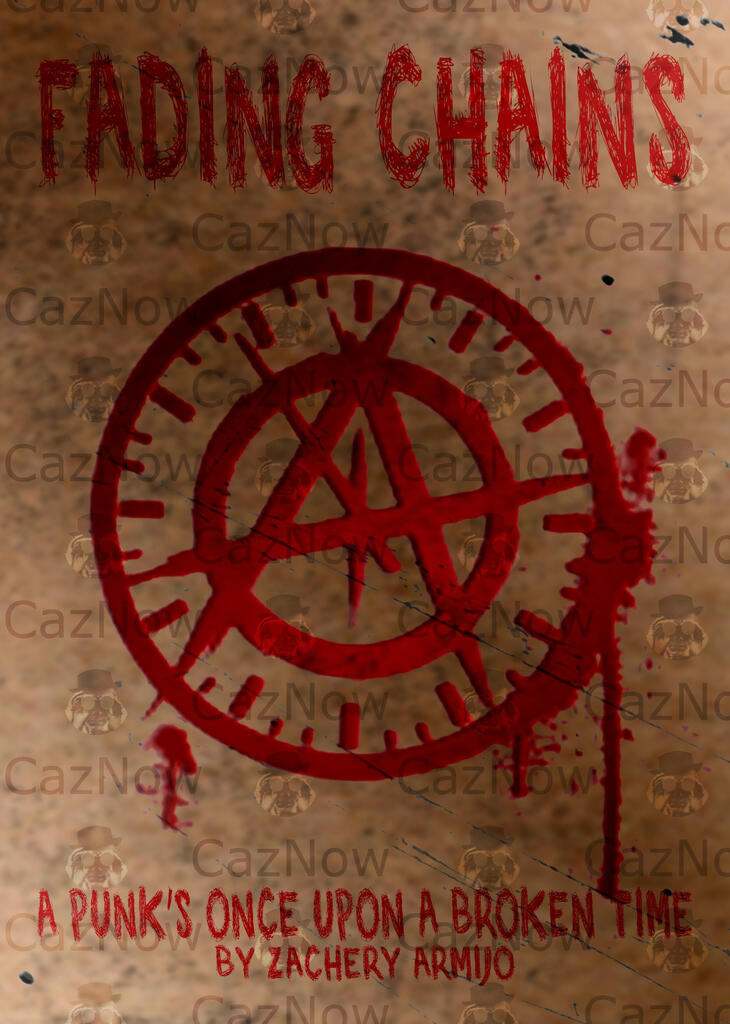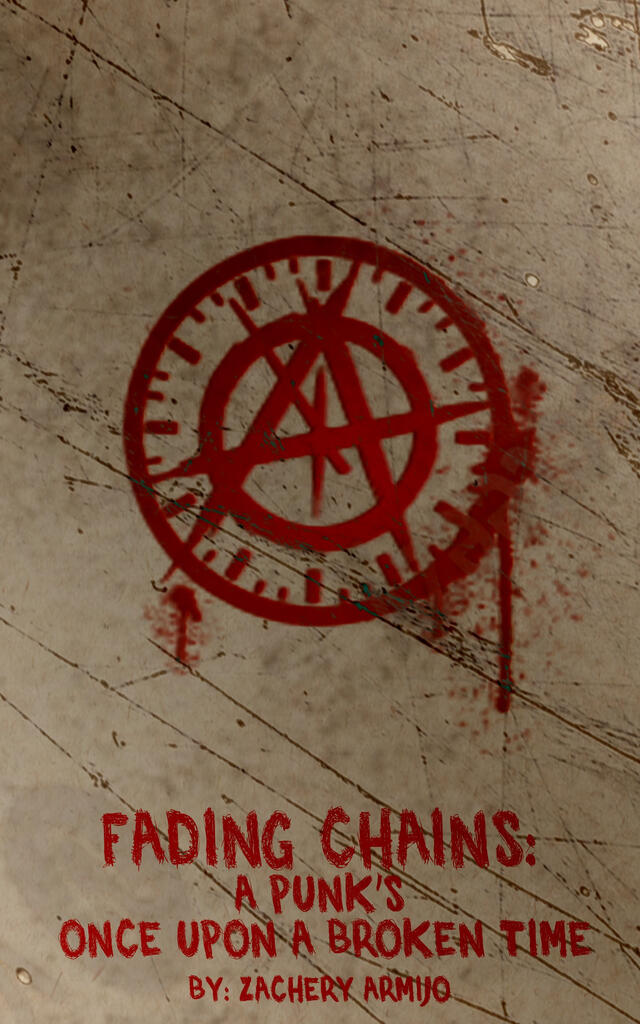About the Book
Fading Chains: A Punk’s Once Upon a Broken Time
Fading Chains: A Punk’s Once Upon a Broken Time is a raw, unfiltered exploration of survival, resilience, and the haunting echoes of time lost. Set in a future where society’s progress feels like a cold, alien tide, the story centers on Caz Martinez, a man released after 350 years of incarceration—a punishment that extended beyond physical confinement into the psychological chains that linger long after the prison gates have opened.Caz's journey is not merely one of freedom but of rediscovery in a world transformed. He steps into an overwhelming landscape of technological marvels, societal disconnect, and personal alienation. The vibrant yet suffocating new reality stands in stark contrast to the muted, predictable existence he knew behind bars. Through lyrical prose and profound introspection, the novel delves into themes of identity, memory, and the eternal struggle to find meaning amidst chaos.Blurring the lines between dystopian fiction and memoir-style reflection, Fading Chains is deeply inspired by the author’s own life experiences. It is a testament to the human spirit's capacity to endure, question, and seek truth, even in the face of systemic oppression and isolation.Readers will find themselves immersed in Caz’s world—a place of both stark beauty and relentless despair—where every step forward feels like a confrontation with the past. The narrative is as much about the chains we inherit and create as it is about the fragile hope that lies in breaking free.
A Gripping Tale of Resilience and Freedom
Fading Chains: A Punk’s Once Upon a Broken Time is a profound exploration of the human spirit's capacity to endure, adapt, and ultimately break free from the most oppressive of chains—both physical and psychological. At its heart, the story is about survival, not just in the literal sense, but also the survival of identity, hope, and humanity in the face of dehumanizing forces.The protagonist, Caz Martinez, emerges from a dystopian world where the concept of freedom has been stripped to its barest essence. After 350 years of confinement, Caz’s release is not a moment of triumphant liberation but a journey fraught with existential questions and emotional weight. The narrative captures the visceral experience of stepping into a world that has moved on without him, highlighting the paradox of freedom as both a gift and a burden.Through vivid descriptions, the story immerses readers in Caz's internal struggles and external challenges. The world he re-enters is one of stark contrasts—technological marvels juxtaposed against the alienation they create. The raw portrayal of his emotions, from the disorienting first steps of freedom to the haunting echoes of his past, makes this a deeply relatable tale for anyone who has felt trapped by circumstances beyond their control. Ultimately, Fading Chains celebrates resilience and the unyielding quest for meaning, making it a gripping tale of human endurance.
Why It’s Perfect for Readers of Dystopian and Punk Fiction
Readers of dystopian and punk fiction will find Fading Chains an unmissable addition to their shelves. The book masterfully intertwines the gritty aesthetics and rebellious ethos of punk with the layered complexities of dystopian storytelling. Fans of these genres are often drawn to narratives that challenge societal norms, explore systemic oppression, and depict individuals resisting dehumanization—and Fading Chains delivers on all fronts.The novel’s dystopian setting is richly detailed, with an oppressive surveillance state that evokes comparisons to classics like 1984 and Brave New World. Yet, it brings a fresh perspective by focusing on the personal rather than the political. Caz’s story is not about overthrowing systems but about reclaiming his sense of self in a world designed to erase individuality.Punk fiction enthusiasts will appreciate the book’s rebellious undercurrent. From Caz’s defiance against the psychological remnants of his imprisonment to his reflections on a society consumed by technology and detachment, the narrative embodies the punk spirit of questioning authority and seeking authenticity. Moreover, the novel’s atmospheric writing, infused with raw emotion and vivid imagery, captures the chaotic beauty and despair inherent in both punk and dystopian genres.Whether you’re drawn to tales of resistance, explorations of post-apocalyptic landscapes, or character-driven narratives that delve into the human psyche, Fading Chains offers a compelling, genre-blending experience.
Written with Raw Emotion and Authenticity
One of the defining features of Fading Chains is its unflinching honesty and emotional depth. Zachery Armijo’s writing pulls no punches, immersing readers in the visceral realities of Caz’s experiences. From the suffocating monotony of life behind bars to the overwhelming sensory assault of freedom, every moment is imbued with authenticity that speaks to the author’s own understanding of struggle and resilience.The narrative is deeply personal, drawing from themes of alienation, loss, and the search for purpose. Caz’s reflections on his past, his fears about the future, and his attempts to reconcile with a world that feels alien highlight a universal truth: freedom is not merely a physical state but a psychological and emotional journey. This rawness makes the story resonate with readers on a deeply human level, transcending the confines of genre.Armijo’s prose is poetic yet grounded, capturing the nuances of Caz’s internal world with a clarity that is both haunting and beautiful. The use of vivid imagery, metaphor, and introspection creates an immersive reading experience that lingers long after the final page. It’s this combination of emotional honesty and literary craftsmanship that makes Fading Chains stand out as a work of fiction written with raw emotion and authenticity.
Fading Chains Punk Poster
Bring the raw intensity of Fading Chains to your walls! This striking poster captures the spirit of rebellion, resilience, and the fight against oppression. Perfect for fans of dystopian worlds and bold, grunge-inspired art. Order now and let this powerful piece inspire your space!

About the Author

I’m Zachery Armijo, and I write because it’s the only way I know how to process the world I’ve lived through. My childhood in Salt Lake City, Utah, was anything but easy. I grew up in a low-income family on the edge of poverty, and my life took some dark turns—homelessness, family struggles with addiction, and more hardship than I care to count. It was a constant fight just to survive, but it was in those rough years that I found an unexpected source of solace: books.
Books became my refuge. I remember reading A Child Called “It” when I was about 12, feeling a sense of connection with the author’s pain. Chicken Soup for the Soul became my emotional survival guide, reminding me that, even in the worst of times, there was always hope. It was in stories like these that I learned that survival wasn’t just about getting by—it was about learning, growing, and transforming. Those books saved me in a way nothing else could.
But it wasn’t until my late teens, after years of rebellion and self-destruction, that I realized I needed to start telling my own story. I couldn’t keep burying the trauma and confusion. Writing became my therapy, a way for me to face the painful memories and make sense of the chaos that had been my life. Through writing, I could transform my pain into something meaningful—not just for me, but for anyone who might read it and feel less alone in their own struggles.
One of the works closest to my heart is Echoes of a Homeless Youth: The Sketches of a Street Rat.It’s a memoir of my years as a homeless teen on the streets of Salt Lake City, and it’s my way of reflecting on that part of my life and the lessons I learned. It’s raw, it’s honest, and it’s not always pretty, but it’s real. I share it with the hope that others who have faced similar struggles will find something in my story that resonates with them, something that reminds them that healing is possible.
My writing, whether it’s in my journal or other projects, is an ongoing journey. It’s a way for me to continue exploring my emotions, reflecting on my past, and understanding who I am. I don’t claim to have all the answers, but I believe that through words, we can connect. Through stories, we can heal.
When I write, I want readers to feel like they’re not alone—that someone else understands the pain, the confusion, and the fight for peace. I don’t write to glorify my past or to wallow in it, but to share the journey of transformation. Life is messy, it’s complicated, but it’s also beautiful in its own way, and that’s something I try to capture in my work.
Thank you for taking the time to read my words. If you find something in my stories that resonates with you, I hope it reminds you that no matter how difficult things get, there’s always the possibility of change. And through that change, there’s always the chance to rebuild, to find peace, and to move forward.
